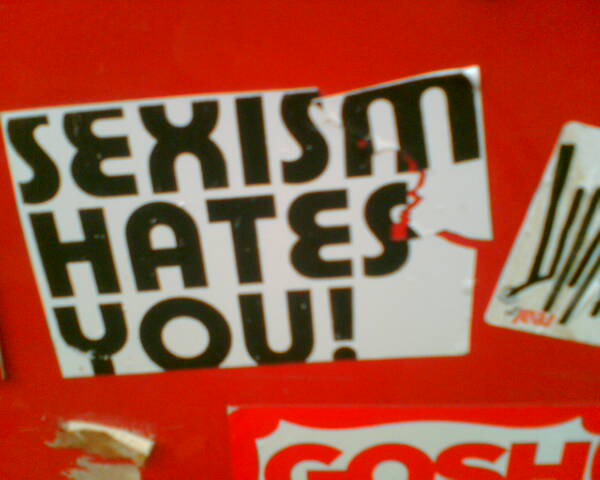Lily McKillop | Contributing Writer
It is easy to think, in a developed country like Ireland, where women have the right to vote, the right to hold office and (relatively) good health care provided by the state, that feminism might be redundant. There are those who will argue that women already have “equality”, and on that basis choose to ignore the complaints put forward by so many women.
But that attitude is a major part of the problem. Misogyny is so incredibly ingrained in our society that both men and women can find it difficult to see the need for feminism or even questioning our attitudes toward women. Misogyny and sexism aren’t always about the pay gap, or about the fact that so disproportionately few females hold positions in the Dail. The everyday experiences of women just as deeply exhibit the disturbing misogyny inherent in our society.
Examining my Facebook newsfeed on any given day, I see the same patterns arise in articles, videos, opinion pieces, etc. “What Disney princesses would look like with a realistic waste line,” or “the troubles with thin-shaming,” or “the problem with fat-shaming,” or, most recently, “Renee Zelwegger looks a bit different after ten years, seriously what is up with that?” Women, it appears, are at the centre of negative attention everywhere.
Both men and, in some cases, women must truly assess how they view females within society, both consciously and subconsciously.
This is also true of the ‘real’ world, and in Ireland itself. Tackling misogyny requires getting at the very root of societal attitudes towards women. We must ask both men and, in some cases, women to truly assess how they view females within society, both consciously and subconsciously. Recently, a video of a woman experiencing street harassment as she walked through New York City went viral. There were mixed reactions. Many took the video as an example of the horrid treatment women experience daily, and the poor attitudes reflected by the men in the video .
Others, however, chose to blame the victim. They chose to focus not on the behaviour of male perpetrators, but rather on what the woman was doing, arguing that she shouldn’t have walked through such a neighbourhood (what was she expecting, really?), that the harassment she experienced 108 times should have been taken as a “compliment”. I found the comments left by many on the RTE news Facebook page to be particularly alarming. They included: “I bet if some stinking rich handsome guy pulled up beside her in a new Porsche she wouldn’t mind being harassed”; “Take the compliment, it’s not ok to be rude and ignoring either. Can’t see the harassment or abuse in this. Free lib is what women wanted after all”; “What do u expect drawing attention to yourself. Dress appropriately and stay away from certain areas on your own.” These are the attitudes of real people in this so-called progressive country.
These embedded attitudes are the most important, and thus most difficult, to tackle. I acknowledge that the streets of Dublin or any major city may not be perfectly safe for men. However, I ask any males reading this: when was the last time you left the house and had to check whether what you were wearing was going to invite unwanted attention. I ask any males reading this what makes it ok to stand back and say nothing when your mate yells at a girl minding her own business on the street. I ask any male reading this what he was thinking when he thought it was ok to grab a girl’s arm, breast, shoulder, or ass when she was walking through a bar or a club, when you would not reasonably expect such attention yourself from a woman.
All men, be they 15 or 50, need to call out any sort of harassment or vile treatment they witness toward other human beings. It is not a compliment. It never is.
Or, more directly, consider this. A few weeks ago I was waiting in line, alone, at Centra after a night out in town. A man to my left started with the usual “Hey girl, how you doing? Hey pretty lady. What’s your name? How you feeling?” After politely telling the man in question to literally fuck off, he proceeded to harass me. Seeing as this was insufficient in getting him to stop, I slapped him, and I told him not to talk to any person like that. He looked shocked and he shut up for a few moments. He then returned to harassing me. After he left the queue, another guy to my right joined in, doing more or less the same thing. At the point at which you feel you have to physically and verbally engage with someone to make them stop harassing you, and at the point at which they ignore your clear anger, discomfort, and indignation, we genuinely have to step back and start questioning just how we really view women.
It’s not enough for a man to simply defend himself and pointing out that he isn’t sexist, or that he has never harassed a woman. It’s up to each man to actually sit down and think: how do I really ‘see’ women? What is my attitude toward them? Do I objectify them, even on a subconscious level? All men, be they 15 or 50, need to call out this and any sort of harassment or vile treatment they witness toward other human beings. It is not a compliment. It never is. Take five minutes to think about it, and do all of the women in your life a favour.
Photo by Rochus Wolff







